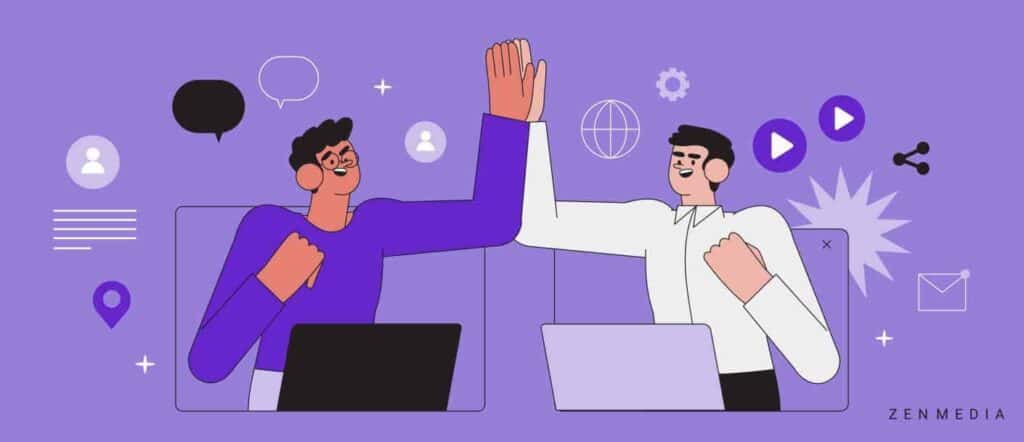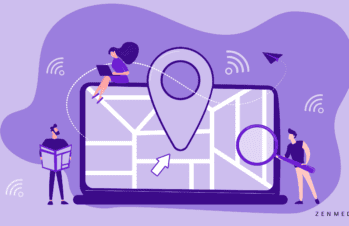B2B brands everywhere are investing more resources in social media. Why?
Because social media is critical for B2B brands that want to:
- Boost their reputation
- Increase their sales
- Earn trust
- Increase their market share
- Retain customers
- Increase customer loyalty
For brands who don’t know where to begin or need some help refining their strategy, B2B social media consulting firms are the perfect way to enhance social media presence. From building content calendars to understanding your audience and implementing the latest tools, let’s take a look at how social media can help B2B brands.
Related reading: The Ultimate Guide to Social Media Platforms for B2B Influencer Marketing
1. Social media is where your customers are
Customer expectations for B2Bs have changed. Just a few years ago, a B2B brand could get away with having only a website and maybe a LinkedIn company page. Today, your buyers want to see you on at least one or two additional platforms.
Why? Because that’s where they are. It’s where they’re getting industry news, finding thought leadership pieces, getting familiar with industry front-runners, and even initiating contact with sales.
It’s also where they’re spending much of the exploration and evaluation phases of the B2B customer journey, searching for relevant content, looking at how you handle customer service, reading reviews, and more.
Take a look at these stats:
- 7 in 10 consumers plan to buy from a brand they follow on social media. (Hootsuite)
- 78% of customers expect personalized responses from brands within 24 hours on social. The same amount will abandon a brand for a competitors if they receive a poor customer experience. (Sprout Social)
- 64% of consumers want brands to connect with them and rank social media as the best avenue to make these connections. (Sprout Social)
These consumers are your buyers. They’re primarily millennials and Gen Z, digitally savvy, and used to doing everything online. If your B2B social media presence is nonexistent, then consumers are likely to pass right over you and move on to your competitors.
The simple truth these days is that brands that aren’t active on social look stagnant.
Whether it’s Instagram, Facebook, LinkedIn, X, TikTok, or YouTube, find at least one social media platform that works for you, make sure it’s the one that your customers use the most, and invest the time and resources necessary to develop a robust and engaging presence. Targeted social outreach will go a long way in boosting your reputation, achieving your business goals, and earning trust online.
2. Social drives traffic to your website
Even if you’re not ready to start selling via your social media channels, they do play an important role in increase your site traffic and directing users to specific pages.
Whether you’re trying to guide target customers to landing pages, content downloads, or free demo sign-ups, B2B social media marketing is key to getting users there. Paid ads also perform this function, but users are increasingly distrustful of advertising (59% of consumers think they see too many social ads, according to Hootsuite).
This means that you simply can’t rely on ads alone, and that social media has to play an even larger role in directing people to the right places.
By delivering value through information or entertainment in a format that your buyers are already familiar with and using regularly, your B2B social media posts can be a much more effective way to increase traffic where it matters the most.
This, in turn, can lead to increased sales and business growth.
3. Buyers are using LinkedIn and influencer marketing to seek out and connect with B2B brands
LinkedIn was already a major player in the B2B world pre-pandemic, but one major shift that continues to move the needle for building professional connections online is an increase in self-service and digital buying.
LinkedIn’s own statistics bear this out.
When it comes to usage, LinkedIn’s platform has 65 million business decision-makers and 10 million C-level executives. Additionally, there are over 17 million thought leaders and 180 million senior-level influencers on the platforms.
In B2B, 93% of content marketers leverage LinkedIn for organic social marketing and 40% of marketers see LinkedIn as the most effective channel for driving high-quality leads.
In short: this is an audience you can’t afford to overlook.
Leverage a B2B social media consulting agency to help you establish a strong presence on LinkedIn. They’ll know all the right people and channels to get your brand to stand out. And when it comes to what you should be sharing on LinkedIn, prioritize thought leadership content like bylines and speaking opportunities; provide valuable insights and commentary on news stories, industry issues, or current events; and, of course, the content your brand is creating.
LinkedIn also provides the perfect opportunity to tap into influencer marketing. Whether you’re looking to elevate your brand’s own subject matter experts or reach your target audience through other creators, LinkedIn is your best bet. Just ensure consistent messaging across your brand and the influencers you’re working with.
Related reading: The Role of Thought Leadership in Brand Promotion
4. Social media content supports a more personalized customer experience
Personalization is what both B2C and B2B customers demand, and social media helps your brand deliver in multiple ways.
For one thing, B2B social media marketing offers customers a more relatable way to connect with your brand, especially if you’ve been diligent about developing your brand voice.
Related reading: 5 Steps to Developing an Outstanding Brand Voice on Social Media
B2B buyers, just like B2C consumers, expect to be able to connect directly with the brands they’re working with. Customer retention starts with connecting with them on this level, anticipating their needs, and responding to them quickly and empathetically. That means getting a personal, human response when they ask a question or post about their experience with your brand. Use social platforms to make these connections and build social listening into your marketing strategy to provide the solutions your target audience actually needs.
But while your customers benefit from your brand’s social media presence, your company stands to benefit even more.
Working with a good B2B social media consulting firm will demonstrate how effective social media management doesn’t just revolve around content creation. They’ll help you interact with your customers to get a clearer picture of what they value and want to engage with.
When you share content on social, for example, the number of engagements can show you the general degree of interest your current and potential customers have in that type of content. You can even ask for their feedback and get their opinions directly (otherwise known as collecting zero-party data).
The data you gather via social media analytics can also help you refine your overall marketing strategy, as well as your product and service offerings. Just as social media allows your customers to see who’s behind your brand, it also allows you to see your customers for who they are online—their interests, needs, desires, and more.
5. B2B buyers are more interested in self-service now than pre-pandemic
According to Forrester, nearly 50% of all business purchases are self-service transactions, with younger generations expecting a frictionless buyer experience.
How does social media play into this?
Social chatbots, like the type brands can employ on Facebook, are one way to offer digital self-service. Additionally, AI and other advanced technologies can leverage data to identify key buyer trends and patterns throughout the customer journey.
Social media content leverages this data to direct users to your self-service channels if they’re housed in an app or on your website. From text-based knowledge bases to video channels and customer preference databases, B2B buyers want to be able to access your resources on their own—without needing to go through a salesperson or representative.
6. B2B social media consulting can amplify your PR results
Finally, working with a B2B social media consulting agency doesn’t just help generate leads, it can significantly boost your PR placements.
While it’s true that the outlets you’ve been covered in will share your featured article or interview, you also need to be sharing it on your social channels. This will not only increase your press’s reach and get more eyes on it—it will also show the outlet that you appreciate the coverage and want it to be successful.
Once press coverage has been published, amplify your results! This means sharing your earned media across all your social media channels to promote your brand’s thought leaders, drive engagement to your social channels, and find more potential clients across the buyer’s journey.
Related reading: How B2Bs Can Amplify Content
And don’t just repost your press hits. Repurpose them across your content marketing efforts (think: blogs, infographics, webinars, and white papers) and use them to support future PR efforts. Earned media is a valuable tool that helps marketing leaders build brand trust, credibility, and authority, and your B2B social media agency will help you get the most out of each hit across your social platforms.
Adding a strong B2B social media marketing strategy to your PR campaigns is just as important for your brand as it is for B2Cs. Social media marketing builds trust, boosts your reputation, encourages brand engagement, and can help you increase sales and share of voice in your industry.
Reach out today to start building your next B2B social media campaign.




